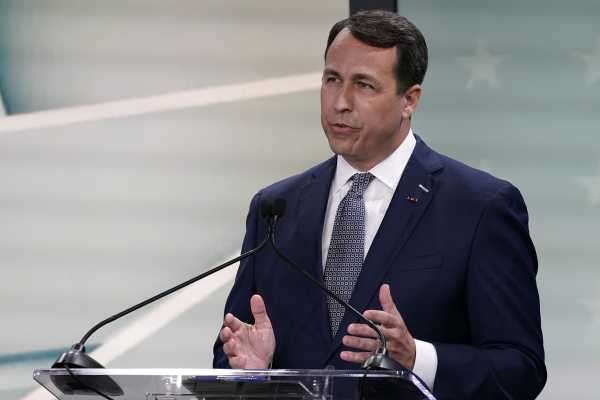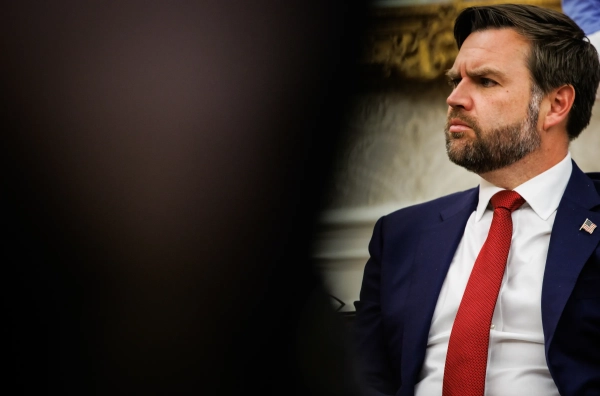
Democrats almost certainly need Cal Cunningham to beat Republican Sen. Thom Tillis in North Carolina to retake a Senate majority.
Cunningham, a former state lawmaker and military prosecutor, is positioning himself as a moderate in step with a moderate North Carolina. He is holding off on aggressively attacking President Trump and instead staying “laser-focused” on Tillis, the incumbent’s record on health care, and what he describes as Tillis’s cowardice in the face of partisan pressure.
“North Carolinians know Thom Tillis,” Cunningham told me in a recent interview. “He has either capitulated to the partisan pressures or walked in line with corporate special interests.”
In late August, I spoke with Cunningham about a range of issues, from the federal government’s Covid-19 response to the Senate filibuster and policing in America. Our conversation has been edited for clarity and length.
Dylan Scott
What do you think is driving this race and how voters are making up their minds here in the final stretch? Early voting starts pretty soon.
Cal Cunningham
So there are a couple of things. First of all, I think North Carolinians know Thom Tillis, and they have very strong negative views about him, about his service, about the things he has chosen to pursue in office, really on issue after issue of importance to North Carolinians. He has either capitulated to the partisan pressures and interests or walked in line with corporate special interests, and in each of those incidents that’s at the expense of North Carolina’s interests and the interests of the people of our state. So there’s first and foremost a very strong sense that he has failed in his most basic duties and office.
And then I think second, I can tell and am telling a deeply rooted North Carolina story. I grew up in a small town, Lexington, the pork barbecue capital of the world, educated at the UNC schools, and built a company here, served with airborne and special operations units deployed out of Fort Bragg with the Army.
And then third, on the issues that are top of mind for North Carolina voters, there’s a strong sense that our politics are broken by political and financial corruption. I’m talking about how as in my time in service, as a military prosecutor, I took on corruption overseas and will do the same in Washington.
That then feeds into a conversation about why we have not done more on health care in our state. Senator Tillis, when he was Speaker of the House, voted to block Medicaid expansion. He, of course, like others in his caucus has voted to repeal the Affordable Care Act and the popular provisions in that.
And then folks feel very vulnerable in this economy, because they are, and even before Covid, I was hearing from a lot of people just getting left behind economically that has become even more urgent in this moment, when public health is roiling our economic health.
Dylan Scott
What do you see as the shortcomings of the US Covid-19 response so far?
Cal Cunningham
Part of it is learned experience from time in military service about how we fight a crisis, whether it’s terrorism or a natural disaster or a public health crisis. It requires a whole of government response led by an administration and a federal government that deploys all available resources.
And here it is hard for us to come to any conclusion other than the federal government has dropped the ball with respect to some of the most basic building blocks of first containing the virus, and then containing the impacts of it.
In the case of my opponent, he was sitting quietly while the president called it a hoax. Senator Tillis was briefed in classified setting as early as January 24. And he spent over a month by his campaign’s own admission doing nothing. Now there were both Republican and Democratic senators who came out of those very briefings sounding alarms. But that almost five-week period in which we now know that the virus was spreading very rapidly here, Senator Tillis was too weak to stand up to the administration and hold it to account to take action. And that included mobilizing resources.
We have the finest public health professionals in the world. We have the greatest ability to move federal money in the world. We can bring to bear extraordinary resources and I analogize, in part, if it had been a terrorist attack, there would have been an address to the nation, probably to a joint session of Congress. There would have not any hesitation to invoke things like the Defense Production Act. There would have been clear communication from the top to every corner of America about how we fight that enemy. Here, we were told it was a hoax.
Dylan Scott
What do you think explains that difference? Why do you think the government or this administration is approaching a pandemic differently than they would a terrorist attack?
Cal Cunningham
Well, let me say this, in the campaign, I’m just incredibly laser-focused on Senator Tillis and the role that a senator should play in a moment like this, or in the case of January, February, March. I could maybe even illustrate with what Senator Tom Cotton did. He was one of a number that were briefed and came out and started ringing alarm bells, including calling on the Department of Health and Human Services, the administration to begin taking steps to fight the crisis.
My guy, the person that I hold accountable here in this race, was not one of them. And that’s in part a dynamic that exists issue after issue. He has demonstrated an unwillingness and an inability to ask the tough questions when a US senator in a coequal branch of government should be doing exactly that.
We can look at things like his flip-flop on the border wall vote last year. The brouhaha right now is after appropriately communicating to North Carolinians about wearing masks, in the midst of the peer pressure on the White House lawn on Thursday, he took a picture showing himself in a mask and then was later caught in pictures without it on. It almost crystallizes the fact that here we have a senator who, on the one hand seems to feel the tug of doing the right thing and then on the other side, capitulates to party pressures and the financial pressures around him.
Dylan Scott
Assuming that you were to be elected in November, and recognizing, of course, that the situation is very fluid — who knows what the next couple months will look like — what do you think the first legislative priority for the new Congress should be in January 2021?
Cal Cunningham
The first legislation that I’ll file, assuming I’m blessed to take the oath of office on January 3, is going to set in motion the overturn of Citizens United.
I think the Senate needs to take up the mantle of political and structural reform. We need healing in our democracy. And I’ve laid out a whole set of reform plans that deal with some of the issues about
Dylan Scott
To ask a more mundane direct question: I think there’s an assumption that unless there’s a miraculous snapback of the economy, that one of the first orders of business for a new Congress and potentially a Biden administration would be another round of economic support or a stimulus package, whatever name you want to give to it.
Could you envision yourself supporting something along those lines, some new investment from the government to try to speed along the economic recovery?
Cal Cunningham
The short answer is yes. Here’s how I think about it, though. First of all, sitting on Mitch McConnell’s desk right now is a bill that’s been pending for the House for some three months. Obviously, it needs work. I’ve voiced some slightly different priorities. But I’m listening to North Carolinians.
And I think most of the proposals that are at least being discussed only include, for instance, federal unemployment assistance through the end of this year. North Carolinians, they’re out of work really for no fault of their own, as their jobs are frozen by the public health crisis. They’re going to need to be able to put food on the table.
At a time when North Carolinians, in particular, are more vulnerable than most to the public health crisis, we have one of the highest rates of uninsured because we didn’t expand Medicaid. We know why we did that, and Tillis proudly takes credit for that. But today, almost 1.3 million out of 10 million people in my state can’t go see a doctor without having to fear what the size of that bill is because they just don’t have coverage.
And so I’ve been calling for reinstating the 100 percent cost share for Medicaid from the federal government until we get out of this crisis, and as additional inducement for the North Carolina legislature to finally act. Some of that’s being litigated at the state legislative level as well, but I got to do my part federally.
I think it is likely the case that we will still have public health and economic urgent needs when I walk into the Senate. And I expect to work to meet those needs, as I’m hearing from North Carolinians.
Dylan Scott
To turn to another issue, criminal justice, that has been dominating of late, I know you have said that you don’t support calls to defund the police. You have voiced openness to certain reform proposals like limiting qualified immunity. I was curious whether that specifically was a new position for you. Has this moment — the protests, the police killings that we’ve seen and the response to them this summer — has it changed your thinking at all about policing in America?
Cal Cunningham
Part of what I’ve done in life, I’ve been a federal prosecutor and a military prosecutor, and I’ve worked with awesome, extraordinarily talented law enforcement professionals — federal, state, local law enforcement professionals. I was also vice chair of the Crime Commission for Governor Roy Cooper here. That commission brings together law enforcement professionals with community groups and other reform groups. And so it’s not new to me to work on law enforcement reform issues, criminal justice reform issues, prison reform issues. I actually chaired a prison reform task force and worked on and made recommendations on curbing school gun violence risks, and then launched a commission to curb the use of cash bail in our state courts.
So a lot of these issues are not new to me from personal life experience. After the George Floyd killing, I spoke with a number of law enforcement leaders and community leaders. In fact, it was a part of a great group over in Cary that after Ferguson — some African American leaders here in the Triangle in North Carolina started barbershop meetings once a month, bringing together the chiefs of police and other law enforcement leaders with community leaders to discuss how do we build bridges? How do we get this right? I actually participated in a couple of those before the George Floyd killing, and so was quickly and easily able to call on those relationships and put out a very thoughtful set of reform ideas, just drawing on what I was hearing from those conversations, but also the personal experiences.
I called for increasing funding to law enforcement, the creation of a Department of Justice grant funding program that would help give our local law enforcement agencies the resources they need to develop and adopt best policies, best practices; in order to pursue accreditation with national accreditation groups that have very thoughtfully helped lead reform. I’m very familiar with President Obama’s 21st Century policing task force and the recommendations in that. And I think, frankly, from my experience, in order to get the law enforcement that our communities deserve, we’re gonna have to pay law enforcement what it deserves. And then we’ve got to strengthen the voice of the reformers within the law enforcement community.
Dylan Scott
I’m obligated as a Vox reporter to ask about the filibuster. I know that Amy Walter asked you about this last month, and you made a distinction that you would support some reforms to the filibuster and how it’s used. But I’ll confess I didn’t see you elaborate on that. So I was wondering if you could just explain when you say you want to reform the filibuster, what exactly do you mean by that?
Cal Cunningham
Right now, from where I sit, what I see is that the filibuster is used to stop debate. It stops progress on whatever the measure is that is put on the docket, put on the agenda. I think we need to hear the debate as a nation. And I’ve heard this called the speaking filibuster. If the minority party wants to stop the progress of the majority party, then let’s cancel the weekends. Turn on the lights and roll in the cops. Because the nation needs to know why. All the editorial writers in the country need to weigh in, and the cable news talking heads need to debate it. If the US Senate is gonna stop progress because the minority party says some rights are being abused or some issue needs to be heard, then let’s hear it. And let’s not use this rule to stop the discussion. Let’s hear it.
And then at the end of it, when everybody said their piece, let’s call for the vote. If the majority prevails, the majority prevails. If the minority is persuasive and the people at home weigh in Mr.-Smith-Goes-to-Washington fashion, then democracy will have worked. The minority party is able to persuade. So let’s hear the debate. Let’s not stop the debate.
And I’ve been on that kick for about a decade, similar to ideas that I threw out 10 years ago. And I’ve now studied a little bit more, I hear from other people in the Senate — Democrats and Republicans who frankly think this is more true to the traditions of the Senate and making it the great deliberative body It should be.
And frankly, I mean, if you go back and study the Federalist Papers, that’s kind of the concept behind the Senate to begin with. It’s supposed to temper the passions of the House but also be able to stand up to an executive when that day may come.
Help keep Vox free for all
Millions turn to Vox each month to understand what’s happening in the news, from the coronavirus crisis to a racial reckoning to what is, quite possibly, the most consequential presidential election of our lifetimes. Our mission has never been more vital than it is in this moment: to empower you through understanding. But our distinctive brand of explanatory journalism takes resources. Even when the economy and the news advertising market recovers, your support will be a critical part of sustaining our resource-intensive work. If you have already contributed, thank you. If you haven’t, please consider helping everyone make sense of an increasingly chaotic world: Contribute today from as little as $3.
Sourse: vox.com






